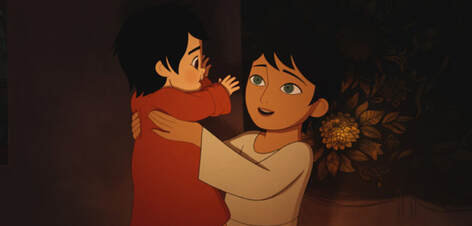A- | After her father is arrested by the Taliban, a young girl must pretend to be a boy if she wants to support her family. Directed by Nora Twohey Starring Saara Taudrey, Soma Bhatia, and Kawa Ada Review by Jon Kissel |

As tyrannical as the Taliban are, their reach still can’t get inside people’s heads, and it’s there that Parvana and her family take refuge. This free space manifests itself in storytelling transmitted from father to daughter and daughter to brother. The former is one of history, no mere collection of dates and names but broad trends that help make sense of the world as it exists. Parvana’s father (Ali Badshah) locates her home country between great empires who interrupted Afghanistan’s intellectual traditions and ensured that any peaceful periods never lasted too long. The last one of these exists in his recent memory, before the Soviet invasion that would cruelly kill his son and take his leg, and the Taliban retrenchment that would put the rest of his family on house arrest and make his job as a teacher obsolete. He’s as buffeted by history as the nation itself, but repeated shots of orange wildflowers blooming in the barren soil serve as a visual metaphor for the presence of goodness amongst tribulation.
Parvana embodies that goodness such that an entire life of uncertainty and spiraling tyranny hasn’t knocked it out of her. With a father deserving of her love, a status not taken as a given based on her interaction with fellow boy-impersonator Shauzia (Soma Bhatia), she’s passing the gift of storytelling onto baby brother Zaki. After her mother (Laara Sadiq) is beaten into a bedridden state by a Taliban brute, it falls to Parvana to entertain him, which she does with a fable animated in a different style than the rest of the film. The fantasy world of Parvana’s story is filled with elephant kings and magic mirrors, but it represents a different moral system than the one that Zaki might’ve grown up in. Her story features a community celebrating as a single entity, not one cordoned off by gender. It rewards characters for helping people in need, specifically women, instead of insulting and beating them. Its climax isn’t a grand battle but a plea for empathy and an ability to see the humanity of your adversaries, a direct comparison to Parvana’s interactions with gentler Taliban member Razaq (Kawa Ada). The Breadwinner gets that stories aren’t only distractions or calmatives but frameworks for how to interact with the real world.
Part of why these kinds of stories work on me is counter-intuitive in that the rules of the protagonist’s world make that world very small, but it also means there’s more to discover. Parvana and Shauzia take joy out of daily interactions like interacting with a shopkeeper. They marvel at the ostensible magic of the moon pulling the ocean’s waters in towards the beach every day. Joy is a gimme onscreen emotion, and it works as well here as anywhere else in part because the circumstances of it are so quotidian. That soon curdles to anger towards a regime that would prevent its citizens from enjoying such small things. Taliban thug Idrees (Noorim Gulamgaus) shoulders most of the easy villain framing, an overexcited teenager giddy with authority and eager to exercise it. He’s the kind of person tyrannical regimes have relied on for centuries, whether they’re marching in brown shirts or khakis and tiki torches. The Breadwinner complicates its antagonists with the presence of the aforementioned Razaq, but Idrees is the other half of the appeal of Middle Eastern female stories. One can’t build a theocratic state without a bullying male in need of cathartic comeuppance.
In keeping with the detail of the hand-drawn animation, Twohey puts the same amount of emotional detail into the characters. Withholding that Parvana’s father is missing a leg for several scenes lets his and her relationship briefly exist unimpeded by this additional wrinkle. The animation of the father’s background story, where he’s running in a hand-held chain with all his siblings and they gradually let go til it’s just him, is a potent gut punch, as is the way that Parvana’s mother cannot stop staring at the newly-shorn Parvana because she looks too much like their dead son and brother. Twohey holds the camera at Parvana’s level as she reads Razaq’s letter to him, so the viewer only sees his hands stop peeling his apple after she hits the bad news. The visual beauty is matched by the emotional beauty on display, culminating in the poeticism of the final lines (raise your words and not your voice: it is rain that makes the flowers grow and not thunder). The film ends with another great empire setting its sights on Afghanistan and an unresolved fate for its characters. It’s easy to imagine a Grave of the Fireflies level disaster on the horizon for them sometime in the intervening war that goes on so long that Zaki would be well into adulthood without an end in sight. That’s not the story I leave The Breadwinner wanting to tell myself, hoping instead that the encroaching thunder won’t stamp out all the precious wildflowers blooming in the dirt. A-
 RSS Feed
RSS Feed